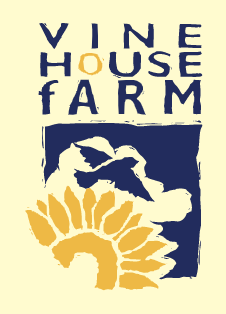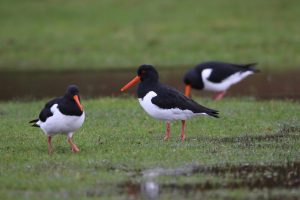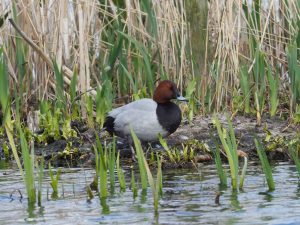
November was a fairly typical month; we certainly had some typical November days of heavy cloud with some drizzle. We also had some nice sunny days however and with the leaves hanging on the trees, this year there have been some beautiful sights. Rainfall has been above average, 56mm or 2.2ins making the rainfall for the year – 610mm or 24ins – already above average. Our average rainfall over the past 45 years is 530mm or 21ins.

The rain during November did not cause us much trouble at Vine House Farm, as October was drier than average.
We’ve been able to get on and finish the rest of the drilling and ploughing in near record time. In the autumn, as you know, every day gets shorter and generally it gets wetter, so it is a race against time to get all the work done. If we don’t have enough men then we don’t get all the work done. If we have too many men and too much machinery then we will waste money and we still have to find those men jobs in the winter. It is a balancing act, farming is all about knowing what you are looking at and doing all the jobs we have to do at the correct time. The weather of course plays a big part of being able to do our jobs at the correct time.
Our other biggest variable is the politician. During the summer, prices for all our crops were very low due to there being a surplus of grain worldwide. However, as Brexit loomed the pound weakened and the value of our crops increased as we are on a world market. We took advantage of the £20 rise in wheat and sold it all. Having said sold it all – we daren’t sell all of it, as we might have miscalculated what we have in store. If we had sold some tonnes we didn’t have in store, those tonnes would be on a contract that have to be supplied. If we could not supply, the merchant has to buy them on the free market and if the price has gone up then we would have to pay the difference.
Continual cultivation degrades the soil, so it could do with a rest, such as a grass ley, but we have no reason to want to sow grass as we have no livestock on our farms. The livestock used to provide fertilizer and at the same time the soil was rested. Our chemical fertilizers have made the livestock redundant, but now we have this weed called blackgrass and our soils are getting less workable, so the soils could do with a rest. Ideally we should be re-introducing stock to our farms and having grass fields.
In the West Country, farmers have also specialised and the land is always grass. These farmers have trouble however, with worm parasites in their sheep and cattle. Whilst chemicals have been available over the past 60 years, in the form of medicine, to give to cattle to kill these parasites, they are now becoming resistant. So this means the fields could do with a change, such as being cultivated for two or three years. The traditional way of farming with a three or four year ley has gone out of the window; farmers have made more money by using chemicals but now our plants and pests are becoming immune. I can’t see a return to mixed farms, so the way we deal with all these problems will be interesting.


We have wintering Stonechats, two or three being present at any one time on the farm. We have had them in other years but not the last two years.
Their breeding success depends very much on the weather and the summer weather also influences the insect population. If the weather suits them they can have three broods during the summer and produce a lot of young. It is not so much about producing the young; the weather and food supplies have to be suitable for those young to survive. Stonechats generally breed where agriculture is not intensive. They move around during the autumn and winter until they find a food supply, which in this area will be a dyke that hasn’t been mown, feeding on any insects that they can find.
Hundreds of Fieldfares and Redwings have moved onto the hawthorn berries down the farm, it is great to see so many birds there. After clearing up all the berries here, they will move south and west doing the same and then start feeding on the ground for apples, worms and other invertebrates. If we get a prolonged spell of frosty weather they will move further south and west until they find unfrozen ground.
Last month I spoke about Lapwings and Golden Plover on the side of the Deeping by-pass. They are still about but not so often on those two fields, but they can also be seen in Langtoft Fen.
I was pleased to see a flock of 500 Golden Plover with 400 Lapwings in fields to the West side of the Deeping bypass. This is more than usual but still less than about 15 years ago. If you’d like to see them they are by the two laybys at the Spalding end of the bypass but you’ll have to use binoculars as they seem to blend in with the soil very well.
The flock these past few weeks has been made up of 2000 Lapwings and 800 Golden Plovers. They are nearly always on fields that were oil seed rape for this year’s harvest – rape attracts slugs which Lapwings eat. They seem to have been ignoring freshly harvested fields of sugar beet, but they do a lot of their feeding at night, so we don’t know what they eat. Lapwings live on the ground and have large eyes which enable them to detect ground mammals even on the darkest of nights, and slugs are moist and also feed on the surface at night. I wonder if the slugs glisten enough for the Lapwings to see them. The fields they are on have been drilled with wheat.
If the weather freezes the ground, the soil invertebrates will go down in the soil and the Lapwings will disappear. They will probably go to the Wash and feed on the salt flats which seldom freeze. They could also go south and west where of course it is generally milder. We have about 100 pairs that breed in the area and I have no idea whether the birds that breed here are in this flock.
Several local people have come to me over the past two weeks saying that they have found dead Barn Owls. During July the voles bred well and Barn Owls thought there was time to have a second brood, some were a bit too late to get going and although they fledged their young, now that the young have to fend for themselves they are not managing in the cold weather to do so. The dead Barn Owls that I have seen have been young ones.
First year survival is very critical for all animals and birds as this is a time when they are learning to forage and learning how to avoid predators. Giving them a surplus of food in our gardens during that first winter will help them to survive when local food might otherwise be in short supply.
WINTER BIRD WATCH
Enjoy a morning watching the birds that Nicholas has attracted to the
farm, through his winter feeding initiatives and conservation measures.
Saturday 21st January 2017
Saturday 28th January 2017



